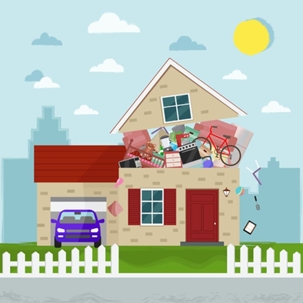Divorce is really messy, sad, and confusing and when one partner is a hoarder, it can add an extra layer of complexity and emotional distress.
Hoarding is a mental health disorder that affects people of all ages, genders, and backgrounds. It's characterized by an excessive accumulation of items, even if they are of little or no value, and an inability to discard them.
If you're married to a hoarder and want to end the marriage, it's essential to approach the situation with compassion and understanding.
As a psychologically trained divorce attorney and mediator, I have helped thousands of couples dealing with many forms of mental illness, including hoarding.
Let me share with you five suggestions on how to compassionately approach divorcing a hoarder.
1. Seek Professional Help
Before you do anything else, it's crucial to seek professional help for your spouse's hoarding disorder. This disorder is a serious mental health issue that requires specialized treatment, such as cognitive-behavioral therapy or medication.
Encourage your spouse to see a therapist or mental health professional who specializes in hoarding disorder. While this won't cure your spouse's hoarding, it can help them learn coping strategies and provide them with the support they need to start dealing with their disorder.
I have exceptional therapists on my team who can help with this form of mental illness. They are an elite group of medical professionals that are part of my comprehensive psychogically-infused mediation process.
2. Set Boundaries
When dealing with a hoarding disorder, it's essential to set boundaries. Let your spouse know that you're concerned about their well-being but that you can no longer live in a hoarding environment. Establish clear boundaries about the living situation, such as not allowing hoarded items in certain areas of the house, or requiring your spouse to clean and organize certain areas of the home. Be clear about your expectations and make sure they understand that you're doing this for both of your safety and well-being.
3. Hire a Professional OrganizerIf your spouse is open to it, consider hiring a professional organizer to help them declutter and organize their living space. A professional organizer can work with your spouse to sort through their belongings and decide what to keep, donate, or discard. This can be a daunting task for someone with a hoarding disorder, but a professional organizer can provide the support and guidance they need.
4. Seek Legal AdviceWhen divorcing a hoarder, it's essential to seek legal advice to ensure that your rights are protected. Consult with an attorney/mediator who specializes in family law to discuss your options and potential outcomes. If you own property together, or if your spouse's hoarding has resulted in financial problems, it's crucial to ensure that you're not left with all the debt or responsibility. As a seasoned divorce attorney/mediator, I have handled hoarding cases where property was damaged due to hoarding issues and financial compensation needed to be considered.
5. Stay CompassionateDivorcing a hoarder can be a long and challenging process, but it's crucial to remain compassionate throughout it. Remember that your spouse is dealing with a mental health disorder, and they may not be able to control their behavior.
Try to approach the situation with empathy and kindness, even if it's difficult. Consider offering your spouse support and resources to help them continue their treatment and recovery.
Divorcing a hoarder with compassion requires a delicate balance of firm boundaries and empathy. Seek professional help, take care of yourself, set boundaries, consider hiring a professional organizer, seek legal advice, and stay compassionate throughout the process.
Remember that your spouse is dealing with a mental health disorder, and while divorce may be necessary, it's crucial to approach the situation with kindness and understanding.
Strongly consider my psychologically based mediation process as your method for divorce since it is an amicable and compassionate approach to divorce.
Acknowledging that mental illness is a third party in your marriage is the first step. The next step is to pick up your phone and call me and my team of experts.
I know this won’t be easy, but helping your spouse, and gaining your freedom and happiness will be worth it.
As a medically trained divorce attorney and mediator, I am uniquely qualified to provide you with the psychological guidance, legal strategy and therapeutic support necessary to remove yourself from the grip of a spouse with a mental illness like hoarding. Call me now to find out more…
All our FREE 1-HOUR CONSULTATIONS are still available virtually.
I look forward to helping you secure a safe and successful removal from a marriage to a spouse with mental illness.
Warm regards,
Lois
New York Divorce Lawyer Lois Brenner is available for a FREE consultation. Call 212.734.1551 now!


